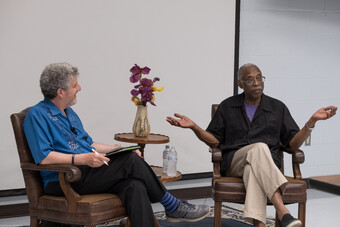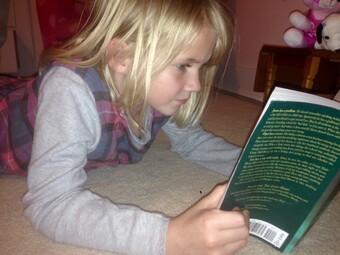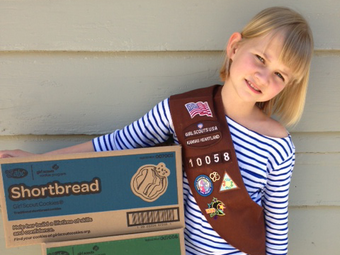Parenting and Playwriting
From the Mouths of Babes, Feedback
This post is part of a regular series on Parenting & Playwriting. If you have a topic you’d like me to address, contact me at [email protected].
Until very recently, my children had never seen one of my plays. They’re too young to appreciate the kind of plays I usually write, and I mainly work out of town. Laying down a lot of money to bring a child to a foreign port to see a play she won’t really understand hasn’t held much appeal. The children know I’m a playwright, and they’ve held my published plays in their little hands, but I don’t know that it means much to them, other than when I’m on my computer, they hear some variation of run along, play by yourself, Mommy’s working.
There are three instances in life when I strongly suggest you tamp down expectations: receiving a present from your in-laws, opening a theatre royalty check, and introducing your children to a play you wrote.
My ignoring them at home doesn’t seem to bother them much, but working away from home certainly does, as I’ve discussed before. I was gone quite a bit last spring, missing a choral recital and an academic awards ceremony. The Professor had to stand in for me at a pre-school Mother’s Day tea. The girls were fussy with my absence, and the mild Professor annoyed at the extra parenting duty during the onslaught of end of the semester grading.
I decided the best remedy would be to fly everybody out to California the day after school ended to see my first play for young audiences, OZ 2.5, a new play inspired by The Wonderful Wizard of Oz and produced by South Coast Repertory. I imagined seeing my work on the stage, especially in such a vibrant, accessible way, would put some missing pieces of the puzzle together for the girls. Yes, Mommy works out of town a lot but look what she does! There’s Kansas, where we live, and look, a tornado and flying fence, and wow, now we’re in a colorful video-game called OZ, with a talking animals, a wicked witch, flying monkeys, and a big tap number (did I mention it was liberal interpretation?). Oh my, doesn’t Mommy have a wondrous, magical job?

There are three instances in life when I strongly suggest you tamp down expectations: receiving a present from your in-laws, opening a theatre royalty check, and introducing your children to a play you wrote.
I’m being a little disingenuous. Laura, five, loved the play. She wanted to go backstage immediately afterwards and take pictures with all the actors. She posed on the set and touched the magical silver shoes on the prop table with awe. For days afterwards, in the Tin Man’s robotic voice, she quoted with perfect melancholy, “It’s harder than I thought to have a heart.” To this day, whenever we see an image from The Wizard of Oz, the movie, she quotes my play instead. Have I ever told you that Laura is an extremely bright child, destined for great things?
When I ask Lizzie, eight, what she thought of the play, she pauses. “It was good,” she said. “But not great.”
I tell her, “Lizzie, if you’re going to criticize a play, you need to be able to make an argument for why you didn’t like something.”
She replies, “I didn’t say I didn’t like it. I said it was good.” She pauses. “But not great.”
I restrain myself from outlining the six Aristotelian principles of drama and demonstrating how my play excels in every single one. I ask instead, “How do you think it could have been better?” Lizzie shrugs. I continue, “I really need your help with this, honey. How can Mommy improve her playwriting, if you don’t tell me what could have been better? I mean, it’s really unfair of you to criticize something and not provide an actual argument with evidence to back up the argument. You don’t want to be a sloppy critic, do you?”
She says, “I don’t want to talk about this anymore.”
Laura, my dear, my darling firstborn, gorgeous, blue-eyed, brilliant, stork-legged, flailing-armed girl, you want to know what’s good but not great? That flower collage you glued together in first grade that hung on the library wall. That was good but not great. Getting a medal for participation in field day. That, too, was good but not great. Coming in third place in the annual coloring contest? Also good but not great. And no, I didn’t make your chorus recital, but I heard all about from Daddy, and from the sound of it, I feel pretty confident in calling the performance good but not great.
I didn’t say that, of course. I let her change the subject to roller coasters or the Penderwick books or bumblebees or whatever was on her eight-year-old mind at the time, because I am, after all, a good mother.
But not great.
Have your children seen a play you’ve written or helped to create? What was their response?







Comments
The article is just the start of the conversation—we want to know what you think about this subject, too! HowlRound is a space for knowledge-sharing, and we welcome spirited, thoughtful, and on-topic dialogue. Find our full comments policy here
So fun, as always.
When we decided, after great debate, to take HM to see his dad in Virginia Wolf (because, hey, how many times are you gonna get to see that?) we led with a long talk about what he was about to see and the notice that we could leave if he got the least bit uncomfortable. At the end of the first act he turned to me and said "I take it it goes downhill from here."
We went for ice cream...
Hilarious! That Hunter has always been precocious!
This is great! My son has always been angry that he's not allowed to read my work so last year, for his birthday, I attempted a TYA play for him. It was okay (but not great) but he loved it. He had my playwriting group read it for him. That said, I'm probably not going to be writing another TYA play any time soon.
Love this! My kids have not yet seen any of my work. They ask me if they can, and when I say no they sigh, "Oh, right. It's for grown-ups." I did take them onto the set of my last local production, which they loved, especially because it had a water cooler.
Children are our unrequested critics sometimes and, after dealing with their bluntness, and my inner child wanting to respond with "nyah, nyah", their words can be sometimes insightful. Just a note: Did you mean "Lizzie [not Laura], my dear, my first born..."?
I did mean Lizzie! I'm so impressed you could keep track. They aren't my kids' real names, so I have trouble remembering who is who.
No she doesn't. But at that time, she probably made the right choice.
The first time a film of mine played on TV, my daughter was about six. She ran around the apartment complex telling everyine my daddy's move is on TV. Then she came and put on The Cosby Show
Hal in the house! I bet she doesn't watch the Cosby Show now...
Oh, I love this piece. Yes, hoping for feedback (of any sort) from the kids is often a recipe for disappointment. I don't think my kids ever saw any of my work until they were teenagers. By then, they were ready for it. My son, who is a young teenager, enjoys short play festivals (especially the one-minute ones), but mostly when they swear or do outrageous things. My daughter, who is now 20, has a bit more stamina, and for the past 5 years I've dragged her to the Boston Theater Marathon, which features 50 plays in 10 hours. She's made it all the way through many times. It's become a father-daughter traditions. (The bad thing is that it's always on Mother's Day, which my wife does not appreciate.)
My daughter has read my first two novels (at least the first one), but I don't think she's read the newest one, and that's kind of cool. My son isn't a reader, but I'm hoping to read the third one (which is dedicated to him) aloud soon. My daughter seemed to like them (probably in the good but not amazing vein). Neither kids is ever impressed with the fact that I'm writer, until their friends find out and think that it's cool--at that point, they might acknowledge that what I do (and why I'm gone at rehearsal for so many nights) is mildly interesting.
I love the father/daughter tradition!
Taking my then-Kindergartner to see a festival of short plays for kids, two of them by me. We enter the black box theater off Times Square. She reacts in surprise: "This is a SMALL theater!" Then she gently pats my arm and says, "But that's OK." Because she realizes in that moment that no, Mama did not write Mary Poppins On Broadway and no one is going to fly or walk up the nonexistent proscenium in this place.
She loved seeing "her" two plays, but another playwright, a genius who truly knows her audience--has included a shocking fart in her play, which wins the day. "Oh Mama, yours were good, but when that lady farted!? That was GREAT!"
More farting...got it.
I have four children--Two love theater, one likes it, and one hates it. Two of the former three are also performers, and they're wonderful, full or praise, and say everything you want them to. The third usually says something along the lines of "I didn't get it," or "It didn't have a happy ending"; she prefers musicals and comedies. The fourth usually asks "Why are you dragging me to another play?" Once, I said, "Someday when I'm gone, you'll be glad you went, and you'll remember it." He said, "I'd rather you remember you another way." Hang in there; we do what we can :)